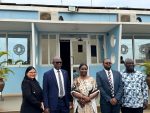President Netumbo Nandi-Ndaitwah has rallied the nation to confront systemic economic inequalities, vowing to prioritize youth employment, fair wages, and the ethical exploitation of natural resources. Speaking to a gathering of workers, union leaders, and dignitaries in Oshakati on May 1, 2025, the President framed her administration’s agenda as a direct response to Namibia’s crippling unemployment crisis and the urgent need to transform raw resource wealth into shared prosperity.
The speech, anchored in the theme “Workers Demand Justice Through Natural Resource Beneficiation, Value Addition, Living Wages, and Youth Employment,” echoed the SWAPO Party’s election manifesto, emphasizing unity and collective action. “We are too few to be poor,” declared Nandi-Ndaitwah, invoking the late President Hage Geingob’s rallying cry. “Our natural resources must lift our people out of poverty through value addition, not raw exports.” Her remarks came against a stark backdrop: Namibia’s unemployment rate stands at 36.9%, with youth joblessness soaring to 44.4%, according to recent Namibia Statistics Agency (NSA) data.
Central to the President’s vision is a shift from exporting unprocessed minerals and raw materials to fostering local manufacturing and industrial growth. She identified sectors such as mining, energy, oil and gas, fisheries, and tourism as economic engines, stressing that Namibia must evolve into a producer of semi-processed and finished goods. “We cannot remain a mere supplier of raw materials while our youth languish without jobs,” she asserted, calling for public-private partnerships to drive industrialization.
The President outlined her administration’s seven key priorities—agriculture, youth empowerment, quality education, healthcare, sports, creative industries, and land reform—supported by eight economic enablers, including mining, energy, and transport logistics. These pillars, integrated into the National Development Plan (NDP6), aim to dismantle systemic barriers to inclusive growth. Nandi-Ndaitwah emphasized that success hinges on harmonizing labor relations, stating, “Workers and employers are two sides of the same coin. Productivity flourishes where there is mutual respect.”
Youth empowerment emerged as a cornerstone of the strategy. The government’s decision to provide free education from primary to tertiary levels, coupled with initiatives like the Youth Internship Programme and the National Youth Apprenticeship scheme, seeks to bridge the skills gap. The President urged the private sector to expand mentorship opportunities and support startups through the Credit Guarantee Scheme, which enables young entrepreneurs to access collateral-free loans. “Our youth must inherit not just land, but opportunities to innovate and lead,” she said.
Nandi-Ndaitwah reaffirmed commitments to social safety nets, including universal old-age pensions, disability grants, and full maternity leave payments. A comprehensive review of Namibia’s minimum wage policy and the establishment of the National Medical Benefits Fund (NMBF) under the Social Security Act were highlighted as critical steps toward safeguarding labor rights. “A hungry worker cannot be productive, and an undervalued worker cannot be a proud citizen,” she remarked, linking economic dignity to national progress.
In a significant administrative shift, the President announced the merger of justice and labor relations functions to strengthen compliance with labor laws and protect workers’ rights. She called on trade unions and employers to eradicate workplace discrimination and uphold the right to unionize. “Social injustices in the labor sector undermine our democracy. Safe, fair workplaces are non-negotiable,” she stated.
The speech paid homage to Namibia’s liberation struggle, drawing parallels between past sacrifices and present-day challenges. Referencing the upcoming Cassinga Massacre commemoration on May 4 and Genocide Remembrance Day on May 28, Nandi-Ndaitwah honored workers who shaped SWAPO’s legacy. “The heroes of our struggle were ordinary workers. Their fight for freedom demands that prosperity reaches every Namibian,” she said.
The President concluded with a stern anti-corruption pledge, declaring a zero-tolerance stance toward unethical practices. “Excellence, integrity, and transparency must define our service to the nation,” she asserted, urging organized labor to hold leaders accountable.
While the speech outlined an ambitious roadmap, Namibia faces formidable hurdles. The reliance on raw material exports, limited industrial infrastructure, and a skills mismatch in the labor market pose significant barriers.
President Nandi-Ndaitwah’s address struck a chord of cautious optimism. By linking economic justice to historical liberation, she framed current struggles as an extension of Namibia’s fight for self-determination. Her administration’s focus on collaboration—between government, workers, and employers—reflects an acknowledgment that no single sector can drive change alone.
As Namibia navigates global economic uncertainties and domestic pressures, the path forward demands balancing ambition with pragmatism. The President’s vision, while aspirational, underscores a stark reality: without addressing unemployment and inequality, Namibia’s hard-won stability remains fragile.
In the words of Nandi-Ndaitwah, “Let this day mark the beginning of a new era, where Namibians do not merely work to survive, but strive to lead a prosperous nation.” The coming years will test whether rhetoric translates into tangible progress for the “Land of the Brave.”










